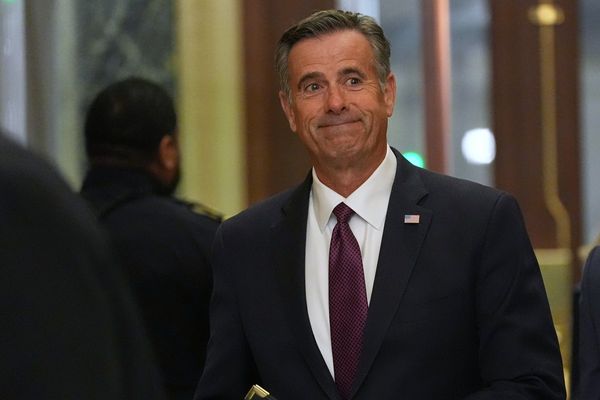Two influential House panels questioned the administration’s top health official Wednesday during hearings on the White House’s fiscal 2025 budget proposal for the Health and Human Services Department, even as Congress races to avoid a partial government shutdown involving this year’s HHS funding.
HHS Secretary Xavier Becerra fielded questions on an array of pet policies tucked into the $130.7 billion fiscal 2025 discretionary spending request for HHS — which includes Food and Drug Administration funding — during back-to-back hearings before the Labor-HHS-Education Appropriations Subcommittee and the Ways and Means Committee.
Here are five policies to watch from Becerra’s trip to Capitol Hill:
Social programs
Most of the requests from Republican lawmakers to create additional guardrails to entitlement programs are non-starters under the Biden administration.
During the appropriations subcommittee hearing, Becerra shot down Kansas Rep. Jake LaTurner’s proposal to allow states to seek Medicaid waivers to implement work requirements, citing that the Temporary Assistance for Needy Families already uses this approach. Prior versions of Medicaid work requirements havefaced legal challenges.
But the secretary found common ground with Rep. Andy Harris, R-Md., on possible changes to the Supplemental Nutrition Assistance Program. HHS held its first “Food is Medicine” summit in January.
Harris asked Becerra if he would support SNAP benefit restrictions on certain foods if a scientific consensus finds that restricting junk food and beverages could prevent diet-related disease in low-income populations.
“I don’t see anything you said that I would disagree with,” said Becerra, adding that the department does not always control what is included in some of these programs. SNAP is managed by the Agriculture Department.
Harris said he’d recently met with the National Institutes of Health about spearheading this type of research.
Marijuana
Rep. Chuck Edwards, R-N.C., and Harris expressed concern with ongoing efforts to review the classification of marijuana, which President Joe Biden touted during his State of the Union address.
Both lawmakers pointed to research linking adolescent marijuana use with changes to brain development and mental health symptoms, while the budget request seeks increased funding for youth mental health. Sen. John Cornyn, R-Texas, had a similar concern during the Finance Committee’s HHS hearing last week.
“I would urge you and I will say that I’ll continue to resist any effort to make these types of substances more available to our youth today,” said Edwards at the appropriations subcommittee hearing.
Rep. Steny H. Hoyer, D-Md., said while he represents the tobacco-growing area of Maryland, he sees cigarette smoking as a greater health cost than marijuana, and called for more federal intervention including passage of a cannabis banking bill.
Surprise billing
Rep. Brad Wenstrup, R-Ohio, inquired at the Ways and Means hearing about the timing of new guidance from HHS regarding surprise medical bills after the department in January dropped an appeal of a court loss over several standards for negotiations between doctors and insurance companies.
Becerra said the department was in the middle of auditing how the payment amounts determined by insurance companies were calculated and applied, with the intention of posting them online for public feedback.
“We’re hoping that this informs everyone on what is expected,” he said.
Harris, at the Labor-HHS-Education Appropriations hearing, asked if an additional $500 million request over 10 years in the budget request would be used to enforce timely provider payments.
Becerra said they have narrowed down the number of ineligible claims and to expect progress.
Nurse staffing standards
House Ways and Means Chairman Jason Smith, R-Mo., asked Becerra to guarantee that no nursing homes would close as a consequence of a September proposal that would implement minimum staffing requirements. The industry vehemently opposes the rule, which is in the final stages of review.
Becerra instead guaranteed that patients who need a nursing home “will find one that offers quality care.” He pointed to the fact that nursing home residents made up less than 1 percent of the population, but nearly 20 percent of deaths from COVID-19.
“Something’s going on. And we can’t just close our eyes to it. We have to make sure that if we’re going to leave our loved one in a nursing home, there is a nurse that is available to provide care. And these standards simply say that.”
Medical devices
Rep. Bill Pascrell Jr., D-N.J., laid into Becerra on the department’s continued decision to not require unique identifiers for medical devices on insurance claims, citing the death of a close friend from a hip operation. Becerra noted that federal advisers on the National Committee on Vital and Health Statistics decided against recommending the use of unique identifiers on Medicare forms last June.
The answer infuriated Pascrell, who implied that HHS was in cahoots with industry interests.
“Everybody is protecting everybody and people are dying,” he said during the Ways and Means hearing.
”You’re doing a hell of a job but this area stinks,” he added.
Current HHS funding for fiscal 2024 expires at midnight Friday evening.
The post With fiscal 2024 funding still in the works, Becerra looks to 2025 appeared first on Roll Call.







